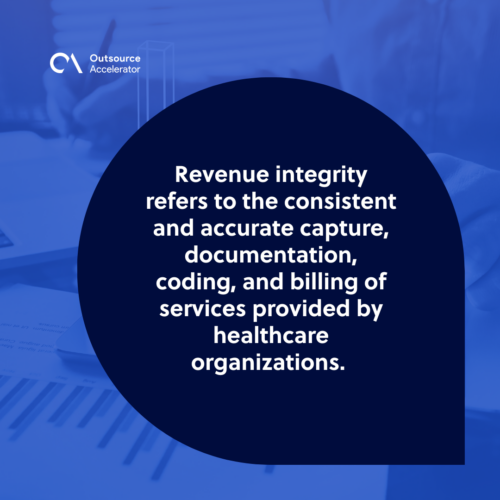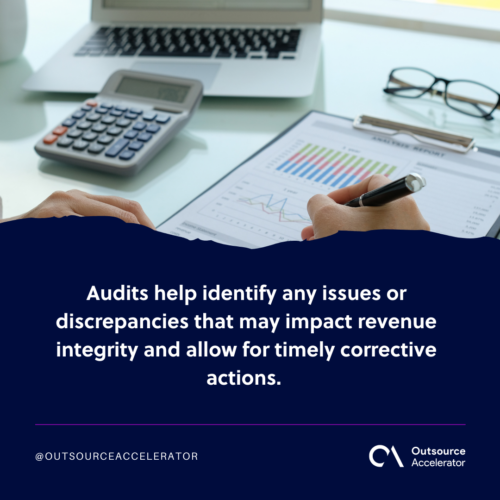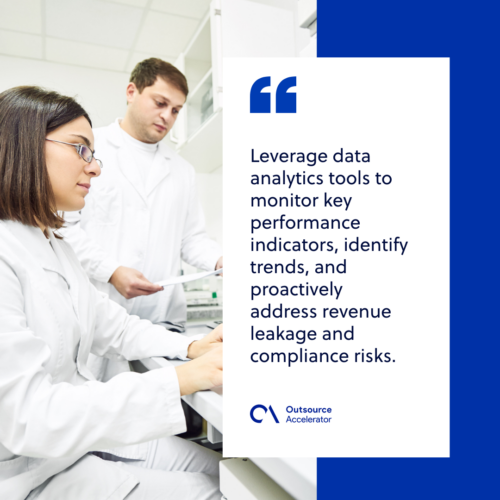Ensuring revenue integrity for healthcare in 2025

Revenue integrity holds immense importance in the healthcare industry as it directly impacts healthcare organizations’ financial stability and sustainability.
Revenue generated from patient care is a crucial funding source for healthcare organizations, enabling them to invest in resources, enhance patient care, and sustain operations.
Revenue integrity is pivotal in supporting the overall mission of healthcare organizations. Healthcare organizations can optimize their financial performance, minimize revenue leakage, and uphold compliance with regulatory guidelines.
In this article, we will delve into the concept of healthcare revenue integrity, exploring its definition, key components, common challenges, and best practices. Join us as we explore and uncover the strategies to thrive in today’s healthcare landscape.
What is revenue integrity?
Revenue integrity refers to the consistent and accurate capture, documentation, coding, and billing of services provided by healthcare organizations.
It encompasses the processes and practices implemented to ensure that the revenue generated from patient care is:
- Maximized
- Compliant with regulatory requirements
- Reflective of the services rendered
It frequently involves a comprehensive revenue integrity program that oversees various aspects of revenue cycle operations to safeguard the financial health of the organization.
This program is essential in promoting sound financial practices and fostering a culture of accountability and accuracy within the organization.
Effective revenue integrity practices are essential for healthcare organizations to maintain financial stability and support sustainable operations. By prioritizing revenue integrity, healthcare organizations can enhance their overall financial performance.

Key components of revenue integrity
Revenue integrity in healthcare encompasses several key components that are crucial for accurate and compliant billing practices.
Charge capture
Charge capture refers to the process of accurately capturing and documenting charges for the services provided by healthcare organizations. It ensures all billable services are identified, documented, and billed correctly.
Accurate charge capture is crucial for revenue integrity, as any missed or inaccurate charges can lead to revenue leakage and compliance issues. Healthcare organizations need to have robust systems and processes in place to capture charges effectively.
Documentation and coding
Accurate and complete documentation of patient encounters is essential to support the services provided and justify the billed charges.
Clinical documentation improvement initiatives focus on enhancing the quality and accuracy of clinical records to ensure that they reflect the true complexity and scope of patient care.
Coding, on the other hand, involves assigning appropriate codes to the documented services to facilitate billing and reimbursement. Proper coding ensures that the services are billed correctly and in compliance with coding guidelines and regulations.
It is crucial to have well-trained coding staff and ongoing education programs to maintain accurate documentation and coding practices.
Compliance and regulatory requirements
Compliance with regulatory requirements is critical to revenue integrity.
Healthcare organizations must adhere to various regulations. These include the Health Insurance Portability and Accountability Act (HIPAA) and the Centers for Medicare and Medicaid Services (CMS) guidelines.
Non-compliance can result in financial penalties, legal issues, and damage to the organization’s reputation. It is essential to establish robust compliance programs, conduct regular audits, and stay updated with the evolving regulatory landscape.
Technology and automation
Revenue cycle management software, automation tools, and electronic health record (EHR) systems can streamline processes, reduce manual errors, and improve efficiency.
These technological solutions can assist in accurate charge capture, coding validation, claims management, and denial management. Implementing the right technology can help healthcare organizations enhance revenue integrity and optimize financial performance.
Revenue integrity audits and reviews
These processes involve examining billing and coding practices, documentation, compliance with regulatory guidelines, and overall revenue cycle management.
Audits help identify any issues or discrepancies that may impact revenue integrity and allow for timely corrective actions.
Internal and external audits can help healthcare organizations proactively address potential problems and improve their revenue cycle processes. Revenue integrity specialists can also conduct periodic reviews.
Training and education
Providing comprehensive training and education to healthcare providers, coding staff, and revenue cycle management personnel is crucial for revenue integrity.
Training programs should focus on:
- Accurate documentation practices
- Compliant coding
- Regulatory requirements
- Best practices in revenue cycle management
Ongoing education ensures that staff remains updated with industry changes, new coding guidelines, and evolving regulatory requirements. Well-informed and trained personnel are better equipped to support revenue integrity efforts.
Data analytics and reporting
Utilizing data analytics tools and generating regular reports can contribute to revenue integrity.
Data analysis helps identify trends, patterns, and potential areas of revenue leakage. Key performance indicators (KPIs) can be monitored to assess the organization’s financial performance and identify areas for improvement.
Data-driven insights enable informed decision-making, strategic planning, and proactive measures to enhance revenue integrity.

Common issues with revenue integrity
Revenue integrity is an integral aspect of financial management in healthcare organizations. However, healthcare organizations often encounter common challenges that impede revenue integrity.
These include the following:
- Inaccurate charge capture – Healthcare organizations may face challenges in accurately capturing charges for services provided, leading to revenue leakage and potential compliance issues.
- Documentation and coding errors – Errors in documentation and coding can result in undercoding or overcoding, leading to revenue loss or potential audits and penalties.
- Inadequate compliance with regulatory requirements – Failure to comply with regulatory guidelines can result in financial penalties, legal issues, and reputational damage.
- Inefficient denial management – Ineffective management of claim denials can result in delayed or denied payments. This impacts revenue flow and overall financial performance.
- Insufficient training and education – Lack of proper training and education for healthcare providers and billing staff can lead to errors in documentation, coding, and billing practices, affecting revenue integrity.
- Ineffective utilization review – Inadequate utilization review processes can lead to overutilization or underutilization of healthcare services.
- Inconsistent revenue cycle processes – Inconsistent or fragmented revenue cycle processes can result in inefficiencies, delays in payment, and increased administrative costs. This affects revenue integrity.
- Lack of data analytics and reporting – Insufficient utilization of data analytics and reporting tools can hinder the identification of revenue leakage, compliance risks, and opportunities for process improvement.
- Inadequate internal controls – Weak internal controls can contribute to fraudulent activities, billing errors, and revenue leakage within healthcare organizations.
- Changes in reimbursement policies – Frequent changes in reimbursement policies, coding guidelines, and payer rules can pose challenges to revenue integrity. Organizations must stay updated and adapt their processes accordingly.
- Fragmented systems and interoperability issues – Incompatibility and lack of integration between different systems used for revenue cycle management can lead to data inaccuracies and challenges in maintaining revenue integrity.
- Insufficient monitoring and auditing practices – Inadequate monitoring and auditing of revenue cycle processes can result in undetected errors, non-compliance, and revenue leakage.
- Lack of alignment between clinical and financial teams – Poor communication and collaboration between clinical and financial teams can impact revenue integrity. This results in documentation and coding discrepancies.
- Inaccurate contract management – Inefficient management of contracts with payers and vendors can result in underpayment or overpayment. Revenue and financial performance is affected.
- Inadequate charge description master (CDM) maintenance – Inaccurate or outdated CDM can lead to coding errors, compliance issues, and revenue leakage in healthcare organizations.
Best practices for achieving revenue integrity
Here are some proven strategies to achieve revenue integrity in your practice:
Implement robust charge capture processes
Establish comprehensive procedures for capturing charges accurately and completely. Ensure that all billable services are captured and documented properly, minimizing the risk of revenue leakage.
Promote accurate documentation and coding
Encourage healthcare specialists to provide thorough and compliant documentation to support accurate coding and billing for revenue integrity. Offer ongoing education and training for providers and coding staff to stay updated with coding guidelines and best practices.
Conduct regular compliance audits
Perform routine audits to identify potential compliance issues and ensure adherence to regulatory requirements. Address any identified deficiencies promptly and implement corrective actions.
Employ technology solutions
Invest in revenue cycle management software and tools to automate and streamline processes, reducing manual errors and enhancing efficiency. Utilize technology for accurate charge capture, coding validation, and claims management.
Foster collaboration between clinical and financial teams
Facilitate effective communication and collaboration between clinical and financial departments. Ensure alignment in documentation, coding, and billing practices. Conducting meetings and education sessions can improve understanding and cooperation toward revenue integrity.
Stay updated with regulatory changes
Maintain up-to-date knowledge of reimbursement policies, coding guidelines, and regulatory requirements. Establish processes for disseminating updated information and provide ongoing training and education for staff.
Establish strong internal controls
Implement robust internal controls, such as segregation of duties, dual verification processes, and ongoing monitoring. Regularly assess and enhance internal controls to prevent fraudulent activities and mitigate risks.
Utilize data analytics and reporting
Leverage data analytics tools to monitor key performance indicators, identify trends, and proactively address revenue leakage and compliance risks. Generate regular reports for management review and decision-making.

Enhance contract management processes
Maintain accurate and up-to-date contracts with payers and vendors, ensuring appropriate reimbursement rates and minimizing underpayments or overpayments. Review contracts to identify opportunities for improvement and renegotiation.
Invest in staff education and training
Provide comprehensive training programs for healthcare providers, coding staff, and revenue cycle management personnel. Offer ongoing education to keep them updated on industry changes, best practices, and compliance requirements.
Foster a culture of accountability and transparency
Revenue integrity requires a culture of responsibility, where individuals are accountable for their actions, and errors are openly acknowledged and addressed. Encourage staff to report concerns or potential compliance issues.
Engage revenue integrity specialists
Consider employing revenue integrity specialists or consultants who can provide expertise in revenue cycle management, compliance, and process improvement. They can offer valuable insights and guidance in optimizing revenue integrity.
Continuously evaluate and improve processes
Finally, regularly assess your revenue cycle processes, measure performance metrics, and seek opportunities for improvement. Implement a culture of continuous quality improvement to ensure ongoing enhancement of revenue integrity practices.







 Independent
Independent




